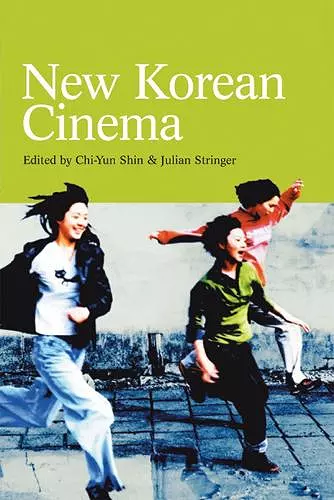New Korean Cinema
Julian Stringer editor Chi-Yun Shin editor
Format:Paperback
Publisher:Edinburgh University Press
Published:11th Jul '05
Currently unavailable, and unfortunately no date known when it will be back

A wide-ranging analysis of one of the world's most important contemporary film industries, New Korean Cinema adopts a cross-cultural and multi-dimensional perspective and provides a comprehensive overview of the production, circulation and reception of modern South Korean cinema. Together with discussions of Korean society and culture, it considers the political economy of the film industry, strategies of domestic and international distribution and marketing, the consumption of films in diverse reception environments, and the relation of film texts to their cultural, historical and social contexts. Gathering critics from Asia, Europe and North America, New Korean Cinema contributes to the discussion of the complex role played by national and regional cinemas in a global age. It will be of interest to students and critics of Popular Culture and Film Studies as well as East Asian Studies and Korean Studies. Features *The most comprehensive study of one of the world's most exciting new cinemas *Provides new insights into the relations forged between cinema and civil society since the early 1990s. *Considers innovative and timely areas of concern such as globalization, transnationalism and new media *Contains in-depth analyses of key films like Chunhyang, Memento Mori, Peppermint Candy and Take Care of My Cat *Includes a glossary of key terms and bibliography of works on Korean cinema *Illustrated with 24 black-and-white stills.
A vital addition to the body of work available to those teaching Asian cinema in the west. It is a clearly structured and well written series of approaches to Korean Cinema. -- Screening the Past Among the most popular cinemas in Asia and increasingly visible and influential in Europe and the US, recent films from South Korea did not arise out of nowhere. This volume, drawing on scholars from three continents, including many native Korean speakers and scholars, provides a wealth of material for understanding the socio-cultural context out of which these popular films arose and in which they are consumed. Yet its greatest contribution may very well be in analysing not just the 'why' of Korean cinema, but the "how" - how the Korean film industry remade itself in the early 1990s to become a veritable juggernaut at home and abroad, a major player in global film culture, arguably more important on the world stage today than either the Japanese or Hong Kong cinemas. To this end, the volume provides insightful glimpses into under-appreciated areas within global film studies, such as the significance of film financing and film festivals; the mobilisation of film genre (Horror, comedy, melodrama); and issues of gender and sexuality. Not just a must-read for scholars of Korean film and culture, or Asian cinema, but a major intervention into the study of global media production and consumption. -- David Desser, Unit for Cinema Studies, University of Illinois at Champaign-Urbana A vital addition to the body of work available to those teaching Asian cinema in the west. It is a clearly structured and well written series of approaches to Korean Cinema. Among the most popular cinemas in Asia and increasingly visible and influential in Europe and the US, recent films from South Korea did not arise out of nowhere. This volume, drawing on scholars from three continents, including many native Korean speakers and scholars, provides a wealth of material for understanding the socio-cultural context out of which these popular films arose and in which they are consumed. Yet its greatest contribution may very well be in analysing not just the 'why' of Korean cinema, but the "how" - how the Korean film industry remade itself in the early 1990s to become a veritable juggernaut at home and abroad, a major player in global film culture, arguably more important on the world stage today than either the Japanese or Hong Kong cinemas. To this end, the volume provides insightful glimpses into under-appreciated areas within global film studies, such as the significance of film financing and film festivals; the mobilisation of film genre (Horror, comedy, melodrama); and issues of gender and sexuality. Not just a must-read for scholars of Korean film and culture, or Asian cinema, but a major intervention into the study of global media production and consumption.
ISBN: 9780748618521
Dimensions: unknown
Weight: 450g
256 pages